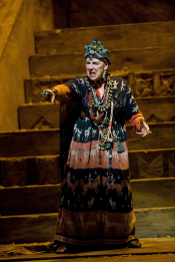18 Dec 2009
Elektra at the Met
The roles Richard Strauss composed for his “chorus” of Five Serving Maids in Elektra — all that remains in the opera of the commentator chorus in Sophocles’ tragedy — are short but arduous.

The roles Richard Strauss composed for his “chorus” of Five Serving Maids in Elektra — all that remains in the opera of the commentator chorus in Sophocles’ tragedy — are short but arduous.
Full-scale power over a huge orchestra is demanded of them, and the parts are often given, like Valkyries or Rhinemaidens, to budding dramatic sopranos. That being understood and the brevity of the parts being acknowledged, still, it is not a good sign when three or four of the maids have louder, more focused, more credibly heroic voices than either Elektra or Chrysothemis. But such was the case at the Met on December 15.
The Elektra was Susan Bullock, who was unable to bring the requisite force to this endurance contest of a part. We must be grateful to any soprano who can simply get through it, but any pressure seemed to push her vibrato wide open, and the whole performance was thin and squally, never vocally overwhelming and uninformed by any vision of Elektra’s personality. Her acting, too, was graceless, which may suit the bedraggled nature of a princess in the mire, but Bullock spent most of the evening staring at the conductor or waving an axe about the stage, and she made little of the dancing, a tricky bit for any Elektra.
Deborah Voigt, in distressing vocal estate, sang Chrysothemis, and never have the two sisters seemed so well-matched, so related: neither of them could bring full force to her music, and they bickered like kittens when the matter under discussion is how they are to murder their mother. Not until the triumphant final scene did Voigt give forth a few of the radiant notes that were once a feature of her Strauss singing. Perhaps it’s just as well the Met shelved the originally scheduled revival of Die Frau ohne Schatten, once a Voigt signature.
 Felicity Palmer as Klytemnestra
Felicity Palmer as Klytemnestra
The appearance of Felicity Palmer as Klytemnestra came as a great relief.
Palmer cannot manage hurricane force either, but she had something more: a
highly focused conception of the character. Her voice seemed dull, drably
colored, as if by the bad dreams and lack of sleep she sings about, and then
color crept in as Elektra goaded her with false hopes and conundrums. Gaunt and
frail but vigorously flailing her staff, she made a striking figure, terrifying
for the example of her fate.
Evgeny Nikitin’s bass-baritone possesses the size and dignity for Orest, but his singing was grainy rather than ominous on this occasion. Wolfgang Schmidt sang an unusually sturdy Aegisth — the role is usually a caricature — and John Easterlin was impressive in the small role of the arrogant servant sent to fetch him.
The tilted Otto Schenk production grows on one with time — its unnerving angles intentionally set the teeth on edge as we meet this most famously dysfunctional of families. I liked David Kneuss’s direction, but I’d like it better if the singers sang to each other now and then, if Elektra didn’t wave her axe like a cheerleader, and if the Overseer did not crack her whip only to have the Serving Maids pay no attention. Surely they would shut up when the whip cracked, if indeed the Overseer were the fearsome creature intended? In which case, the whip cracks should be timed for those few moments in their scene when the maids are about to shut up.
The hero of the night was Fabio Luisi in the pit, a masterful Strauss conductor who spared us nothing of the brutality of this devastating score but at the same time was always careful never to contest the air with his singers, holding the turbulence down so that vocal lines were clear. Underpowered some of them might be, drowned out never. Such courtesy and skill have not always been featured by conductors of Elektra.
John Yohalem